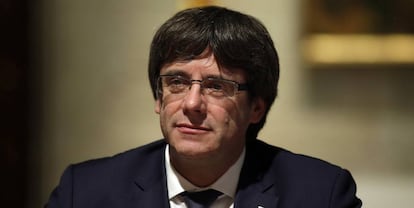Pressure rises on Catalan regional premier ahead of parliament session
Senior pro-independence politician told the BBC yesterday that Carles Puigdemont will opt for a “symbolic declaration” of secession on Tuesday

Regional premier Carles Puigdemont will appear tomorrow in the Catalan parliament to “report on the current political situation.” Once the session is opened, anything is possible, including a unilateral declaration of independence if the order of the day is changed. All eyes are on Puigdemont, who has the last word in deciding how to apply the result of last Sunday’s illegal referendum on independence. The head of PDeCAT, an independence supporting party, Marta Pascal, told the BBC yesterday that the regional government is going to opt for a “symbolic declaration” of secession.

The regional premier has always been pro-independence and few doubt his commitment to acting on the results of the referendum. On last night’s 30 Minutes, on regional public TV channel TV-3, Puigdemont did not give details of his immediate plans after the referendum or whether he will declare independence in parliament on Tuesday. TV-3 broadcast a preview of the report that included this statement from the politician: “A declaration of independence is provided for by the referendum law based on the results, so we will apply what the law allows.” However, this phrase did not appear in the final program.
We have said yes to mediation, but the days pass and if the Spanish state does not respond positively, we will do what we have come to do Catalan regional premier Carles Puigdemont
The show closed with an appeal from Puigdemont to Prime Minister Mariano Rajoy to accept mediation. “We have opened the door to mediation and we have said yes to as many options of mediation as we have been asked. But the days pass and if the Spanish state does not respond positively, we will do what we have come to do.”
The protest yesterday in Barcelona in favor of a unified Spain put more pressure on the possible declaration of independence. The secessionist government looked on “with respect” as people who oppose succession mobilized – the scenes yesterday showed that the street is not just for the secessionists.
The secrecy of the regional government with regard to its plans for Tuesday’s session in parliament were dealt a blow on Sunday after the head of the PDeCAT party, Marta Pascal, told a BBC reporter that the Catalan leader would opt for a “symbolic declaration.” Puigdemont would recognize the validity of the referendum results before the legislative body, but would not make a formal declaration of independence. He would then outline the road map that they will follow to achieve secession from Spain. Last night, party sources said they had asked for a rectification from the British media outlet for what they considered a “misinterpretation” of the conversation with Pascal.
Pressure for the declaration of independence not to be declared is coming from all sides. Former regional premier Artur Mas admitted on Friday in an interview with UK daily the Financial Times that Catalonia was not ready to be independent, as it lacked basic state structures and its own treasury.
If there is a declaration of independence, a series of Catalan companies would follow in moving their legal headquarters
The plan is not a simple one to implement and even within PDeCAT there are doubts about the timings. The regional government took a few days last week to try and reorganize their script, while advocating for international mediation to restore institutional normality between the central government and Catalonia. They are also dissatisfied with the response from Brussels regarding the Catalan conflict. The conviction is that everything is “on the brink” – “We have never gone so far” – but the utmost care must be taken with the next steps.
The secessionist attempts have clashed head-on with economic powers. A week ago, there were six Catalan companies in Spain’s benchmark Ibex 35 stock market index, and it is possible that today there will only be one left. Abertis, Colonial, and Cellnex will decide on Monday if they want to move their legal headquarters out of Catalonia, following the lead of Gas Natural, Caixabank, and Banco Sabadell.
The situation is so delicate that Puigdemont met with Juan José Brugera, the president of the Círculo de Economía, the business lobby that brings together big business and Catalan economists and academics. Brugera expressed concern about the situation and warned that if the premier went ahead with his plans for a declaration of independence a series of Catalan companies would follow in moving elsewhere.
Sources familiar with the meeting say Puigdemont was aware of the situation. This contrasts with statements from deputy premier, Oriol Junqueras, who last week denied that companies from Catalonia were going to move if there was a break with Spain.
English version by Debora Almeida.
Tu suscripción se está usando en otro dispositivo
¿Quieres añadir otro usuario a tu suscripción?
Si continúas leyendo en este dispositivo, no se podrá leer en el otro.
FlechaTu suscripción se está usando en otro dispositivo y solo puedes acceder a EL PAÍS desde un dispositivo a la vez.
Si quieres compartir tu cuenta, cambia tu suscripción a la modalidad Premium, así podrás añadir otro usuario. Cada uno accederá con su propia cuenta de email, lo que os permitirá personalizar vuestra experiencia en EL PAÍS.
¿Tienes una suscripción de empresa? Accede aquí para contratar más cuentas.
En el caso de no saber quién está usando tu cuenta, te recomendamos cambiar tu contraseña aquí.
Si decides continuar compartiendo tu cuenta, este mensaje se mostrará en tu dispositivo y en el de la otra persona que está usando tu cuenta de forma indefinida, afectando a tu experiencia de lectura. Puedes consultar aquí los términos y condiciones de la suscripción digital.








































